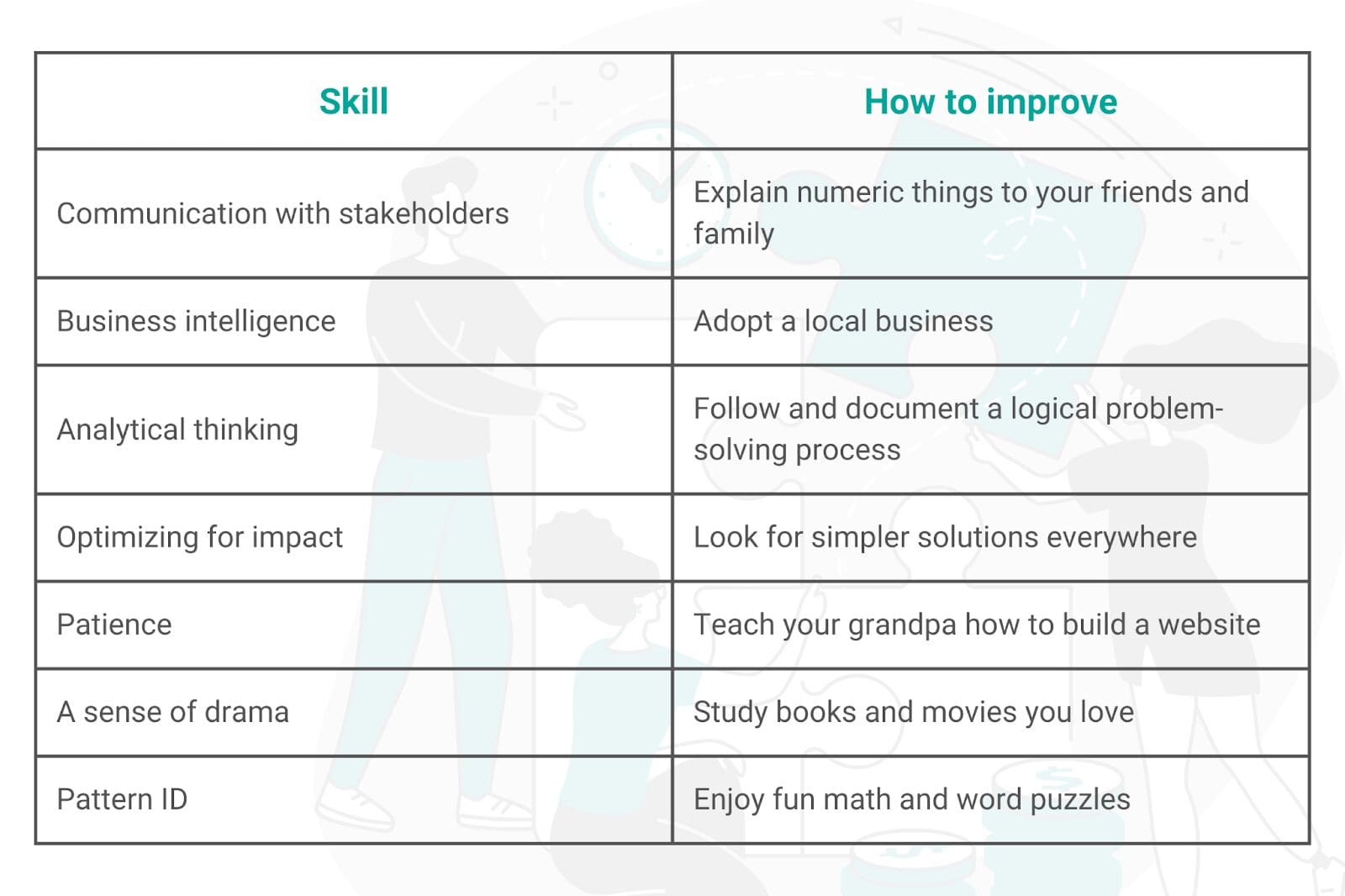7 Unique Skills That Set Data Scientists Apart From Other Professions
To be a data scientist, and especially to be a good one, you need these seven skills to do your job and stand out. These seven skills also transfer really well to other professions.

Being a data scientist comes down to this: working with data, extracting insights, and communicating those insights. That breaks down into seven unique skills that no other job demands, even those very closely adjacent jobs like data analysts and data engineers.
To be a data scientist, and especially to be a good one, you need these seven skills to do your job and stand out. These seven skills also transfer really well to other professions.
The interesting thing about working in data science is that hard skills aren’t as in high demand as soft skills. Anyone can learn to code in Python. The company you work for might migrate to a new infrastructure next year. Hard skills are optional. Soft skills, by contrast, are non-negotiable and much harder to acquire. There’s no eight-week Bootcamp for business thinking. There’s no certificate for analytical problem-solving.
So what seven skills separate data scientists from every other data job out there? Let’s dive in.

1. Communication With Your Stakeholders
Data scientists occupy a slightly hazardous niche in the business: they must translate technical use to businesses and back again with ease. As a data scientist, you have to communicate findings to a technical team in a way that makes sense to them, while also constructing a graph to help the business team understand the business implications of your awesome finding.
For example, you might need to explain to your (technical) data engineer the business reason why they have to structure the data differently for you. Then you might need to share the outcome of that with your (business-side) boss to explain why they should care.
It’s not an easy job. Most data jobs sit on one side of the fence or the other. Only data scientists are asked to hop from technical to business on a daily basis.
How can you improve this? You can practice the business side of things with your non-technical friends and family. See if you can get them to care about your numbers. You can improve your technical team communication by asking the technical teams what they need from you, and how you can work more closely with them. Usually, they won’t be shy about giving you an answer.
2. Business Intelligence
Many people think of data scientists as people who work with numbers day in and day out. Nothing could be further from the truth. While data scientists do crunch numbers and clean data, one of their primary roles is thinking about their findings critically, and asking the kinds of questions that affect businesses in the future.
For example, let’s say a makeup company is asked to increase personalization to boost profits. A data scientist has to understand how the business works to be able to build a predictive model that allows her to say, “Well, hang on, the average customer has a loyalty card, right? We can use that to match transactions to individuals. Then we can predict that Customer A will want nail polish remover, while Customer B will be more interested in blush.”
Certain jobs will look at the numbers behind that. Others will look at customer behavior. Only the data scientist has to understand both. Knowing how the business works, and what the KPIs are, is critical to being a good data scientist.
The best way to improve your business intelligence skills is by getting invested in a business - it doesn’t even have to be your own! Maybe there’s a potted plant company you love or a restaurant you adore. Get used to asking questions about how their businesses run, and what kinds of insights would be useful for them to grow. Then you can apply those skills to your own job.
3. Analytical and Structured Thinking to Solve Problems
A data scientist runs into all kinds of thorny problems on a daily. However, data scientist doesn’t have time to fully address and unravel all these issues at their leisure. Instead, data scientists absolutely must be able to take a problem and think about it in a structured, analytical way.
This comes back to data scientists being expected to straddle the technical and business sides of fences. Often, external clients or internal business teams will have a problem they’ll run by you. These teams may not have a clear idea of the outcome they’re expecting. It’s up to you as the data scientist to take the problem, simplify it down to its core elements, make assumptions, and think of ways to prove and solve it.
Data scientists will also be slammed with complex and messy datasets, and they’ll be asked to dig through them to create predictive and useful models for the business to use. To do this, data scientists need a structured and logical approach to problem-solving.
Helpfully, there’s a great process to follow if you want to boost your structured thinking skills. First, understand how to identify problems. When you face a new scenario, think about the circumstances. Next, ask questions to get to the core of the problem. What’s the reason for this? What are you overlooking? After, determine your biases. Get into the habit of determining your assumptions. Next, anticipate the roadblocks – what could go wrong in the situation? What consequences could arise? Finally, practice coming up with answers without using Google. (You can use Google to check yourself, but you want to get into the habit of thinking independently.)
There’s a great guide to follow here for further instruction and examples.
4. Optimizing for Impact
This is also known as “don’t get carried away.” Data scientists need to know how to build complex, sexy models. But data scientists also need to know when that isn’t necessary, and maybe when a simple analysis will suffice.
Junior data scientists tend to build robust, deep ML models to answer simple questions. Better data scientists instead keep their analyses simple enough to answer the question. That’s why one of the key skills that differentiate data scientists is avoiding complexity for the sake of complexity.
The ability to identify and use the fastest, simplest method of answering a question is highly underrated in the data science field. The best way to improve is simply by asking yourself: is there an easier way to do this? Assume there almost always is.
5. Patience
Part of being a data scientist is being able to roll with the punches. There are business people who will ask for technical things they don't understand. There will be technical people asking for things the business picture can’t allow. And in the middle, data scientists will need to work out who to accommodate and when. That requires a lot of calm, deep breaths.
For example, data scientist Paul May writes that he’s seen data science companies “demand that neural networks (because it is sexy) must be used in their project, even though it is completely inappropriate or underperforms compared to alternative algorithms.” The data scientist has to decide: do they figure out a way to make it work? Or do they tell their business lead this makes no sense?
As a data scientist, you need to put up with repeated misunderstandings of what you do, being assigned anything to do with data because it’s in your job title, and people thinking what you do is magic because the field of data is poorly understood. Patience is a vital virtue for anyone in data science.
This one’s a hard one to practice. My best recommendation is to teach a friend or relative something extremely technical and answer every single one of their questions with grace and insight.
6. A Sense of Drama
Do you know that friend in your social circle who’s just amazing at telling anecdotes? By the end of their story, everyone’s laughing along with them. They have an impeccable sense of timing and storytelling. That’s the skill a data scientist needs.
So much of data science is in storytelling. Not just storytelling, but convincing storytelling. As the person who sits between the technical and business sides of the company, you need to share the numbers in a way that gets stakeholders to care. And a lot of that comes down to drama.
Anyone can put together a slide deck that shares the interesting numbers in a relevant way. Data scientists need to do that with panache, style, and yes, drama.
A great (and fun) way to improve is watching films and reading books. Identify what you do and don’t like about the stories you’re consuming. What foreshadowing do they use? How does the hero’s journey convey emotion and results?
7. Pattern Identification
There’s this idea that gut intuition is bad, and only data is good. That’s not quite true. After all, we hire humans, not machines, because machines can’t (yet) replicate our intuition and pattern identification.
When it comes to data science, pattern identification is a key soft skill. Data scientists have to sift through piles and piles of data until they get a feeling about a potentially significant signal. Then they have to look at the data again to back up their gut feeling. But having the ability to trust your gut to spot a pattern is as important as the technical skills needed to analyze the data.
That’s why many data scientists advocate leading with your gut and following the data. With so much data available, data scientists need to know where to look to begin. There are tons of fun word or math games you can use to practice your instinctive pattern recognition skills, like Brilliant.org.
These seven unique skills make a data scientist.
Until you can honestly say that you possess all seven of these “soft” skills, you haven’t achieved your full potential as a data scientist. These seven skills make data scientists stand apart from every other data-adjacent job.
As you probably noticed, a lot of this comes down to the slightly awkward position of occupying the business and technical hemispheres of a company. (Being able to walk that line also requires a bonus eighth soft skill: humor.) But a lot of these skills also rely on self-confidence, like trusting your gut; and personality, like being patient with repeated misunderstandings or ridiculous demands.
These seven skills are hard to cultivate, rare to find, and priceless in a data scientist. If you have these, hopefully, your workplace appreciates you!
If you also want to find out what technical skills you should have to be advance as a data scientist, go through this post “What Skills Do You Need as a Data Scientist?”.
Nate Rosidi is a data scientist and in product strategy. He's also an adjunct professor teaching analytics, and is the founder of StrataScratch, a platform helping data scientists prepare for their interviews with real interview questions from top companies. Connect with him on Twitter: StrataScratch or LinkedIn.
